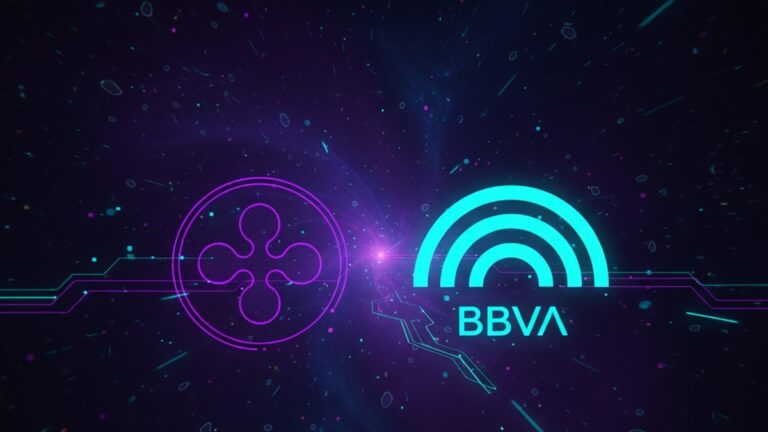In a strategic move to bolster its presence in the European digital asset market, Ripple has announced an expansion of its partnership with Spanish banking giant BBVA. This development marks a significant stride in Ripple’s mission to integrate its digital asset custody technology into mainstream banking, particularly in light of the new Market in Crypto Assets (MiCA) regulation that is reshaping the European financial landscape.
A New Chapter for Ripple and BBVA
Ripple’s collaboration with BBVA, one of Spain’s leading financial institutions, isn’t entirely new. The two companies have already ventured into the realms of digital asset management in Switzerland and Turkey. However, this latest agreement introduces Ripple’s cutting-edge digital asset custody solutions to BBVA’s retail customers in Spain, allowing them to trade and securely hold cryptocurrencies like Bitcoin and Ether.
The integration of Ripple’s technology is poised to enhance BBVA’s recently launched retail service, which aims to cater to the growing demand for digital asset services among its customers. Francisco Maroto, BBVA’s head of digital assets, emphasized the significance of this development, stating, “The integration allows the bank to directly provide an end-to-end custody service with the security customers expect from a major financial institution.”
Navigating MiCA’s New Regulatory Waters
The partnership’s timing couldn’t be more opportune, as the MiCA regulation has established a comprehensive framework for offering digital asset services across the European Union. This regulation is seen as a catalyst for traditional banks to explore and expand their digital asset offerings. Cassie Craddock, Ripple’s managing director for Europe, remarked, “Now that MiCA is established, the region’s banks are emboldened to launch the digital asset offerings that their customers are asking for.”
Indeed, MiCA aims to harmonize the European crypto market, providing clarity and security for both service providers and consumers. By ensuring a standardized approach to digital asset services, MiCA encourages banks like BBVA to innovate with confidence, knowing they are operating within a clear regulatory framework.
Ripple’s Strategic Expansion
Ripple’s decision to partner with BBVA in Spain is part of a broader strategy to establish a stronger foothold in Europe’s regulated digital asset market. This move follows Ripple’s acquisition of Swiss crypto custody specialist Metaco, a company that had previously signed an agreement with BBVA. Ripple Custody, born out of this acquisition, represents a robust solution for financial institutions looking to manage and secure digital assets.
For Ripple, the partnership with BBVA is not merely about expanding its technological reach but also about solidifying its position as a trusted infrastructure provider in the digital asset space. With over 60 regulatory licenses globally, Ripple stands as a formidable player in the crypto industry, capable of offering reliable and secure solutions to traditional banks venturing into the digital realm.
Balancing Innovation and Security
As traditional banks like BBVA adopt Ripple’s technology, a shift is occurring in how these institutions approach cryptocurrency. Historically, many banks have relied on third-party providers to manage digital assets. However, there is a growing trend towards building in-house services using established infrastructure providers like Ripple.
This shift is driven by a desire for greater control and security over digital asset management. By leveraging Ripple’s solutions, BBVA can offer its customers an integrated service that meets the highest standards of security and compliance. This move not only enhances customer trust but also positions BBVA as a leader in the rapidly evolving digital asset market.
The Road Ahead
As Ripple and BBVA forge ahead with their expanded partnership, the implications for the wider banking industry are profound. This collaboration sets a precedent for how traditional financial institutions can successfully integrate digital asset services into their offerings. By embracing technology and innovation while adhering to regulatory standards, banks can meet the growing demand for crypto services and stay competitive in a rapidly changing market.
Looking forward, the success of Ripple and BBVA’s collaboration in Spain could inspire other European banks to explore similar partnerships. As the digital asset market continues to mature, the role of established technology providers like Ripple will be crucial in guiding traditional banks through this transformation.
In conclusion, Ripple’s partnership with BBVA in Spain represents a significant milestone in the integration of digital assets into mainstream banking. By capitalizing on the opportunities presented by MiCA and leveraging Ripple’s technological expertise, BBVA is poised to offer its customers a secure and innovative digital asset service. As the partnership unfolds, it promises to be a model for how traditional banks can successfully navigate the complexities of the digital asset landscape.

Steve Gregory is a lawyer in the United States who specializes in licensing for cryptocurrency companies and products. Steve began his career as an attorney in 2015 but made the switch to working in cryptocurrency full time shortly after joining the original team at Gemini Trust Company, an early cryptocurrency exchange based in New York City. Steve then joined CEX.io and was able to launch their regulated US-based cryptocurrency. Steve then went on to become the CEO at currency.com when he ran for four years and was able to lead currency.com to being fully acquired in 2025.


